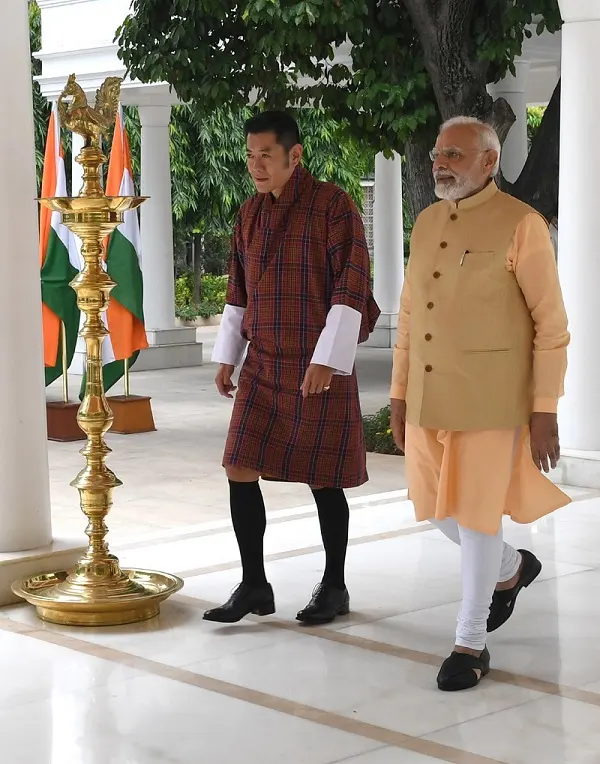

PM Narendra Modi with the King of Bhutan, Jigme Khesar Namgyel Wangchuck, in New Delhi on September 14, 2022 (PIB file photo)
In a special gesture, External Affairs Minister S Jaishankar received the King of Bhutan Jigme Khesar Namgyel Wangchuck at the Delhi airport as he arrived on an official three-day India visit on Monday.
The Bhutanese monarch, an alumnus of the National Defence College (NDC), is scheduled to hold discussions with President Droupadi Murmu and Prime Minister Narendra Modi on Tuesday.
The significant meetings take place at a time when China has upped the ante on expediting Bhutan-China boundary negotiations and Bhutan Prime Minister Lotay Tshering made certain comments recently that require clarifications.
India, nevertheless asserted that the Bhutanese King’s visit is in keeping with the longstanding tradition of regular high-level exchanges between the two countries which enjoy unique ties of friendship and cooperation characterized by understanding and mutual trust.
“Honoured to welcome His Majesty the King of Bhutan, Jigme Khesar Namgyel Wangchuck, on his arrival in India. His visit will further strengthen the close and unique India-Bhutan partnership,” tweeted Jaishankar after receiving the monarch.
“The visit would provide an opportunity to both the sides to review the entire gamut of bilateral cooperation and to further advance the close bilateral partnership, including economic and development cooperation,” added the MEA statement.
In a pre-departure statement, Thimpu too stressed that the King’s visit is a testament to the longstanding and deep-rooted friendship between Bhutan and India, and will further strengthen the close ties between the two countries.
Also accompanying Bhutan’s fifth King is the country’s Foreign Affairs and External Trade Minister Tandi Dorji and other senior officials of the royal government.
Interestingly, it was Dorji who had signed the Memorandum of Understanding (MoU) between Bhutan and China in October 2021 which listed a ‘three-step roadmap’ for expediting the boundary negotiations between the two neighbouring countries.
“It is expected that the implementation of this roadmap in a spirit of goodwill, understanding and accommodation will bring the boundary negotiations to a successful conclusion that is acceptable to both sides,” said the Bhutanese Foreign Ministry after the signing of the MoU.
Boundary negotiations between Bhutan and China began in 1984 and the two sides have held over two dozen rounds of boundary talks and several rounds of meetings at the ‘Expert Group’ level. The negotiations have been guided by the 1988 Joint Communique on the Guiding Principles for the Settlement of the Boundary and the 1998 Agreement on the maintenance of peace, tranquility and status quo in the Bhutan-China Border areas.
From an Indian perspective, Bhutan-China relations must not undermine the special ties between New Delhi and Thimpu. Besides, any agreement between the two countries must ensure India’s national security, especially the safety of the Siliguri corridor that connects the rest of India with the northeast.
The security of the corridor was in prime focus during the 73-day standoff between India and China in 2017.
The issue came into the limelight once again during Bhutan PM Lotay Tshering’s recent Europe visit when he made certain comments on the Doklam region.
“Doklam is a junction point between India, China and Bhutan. It is not up to Bhutan alone to solve the problem. We are three. There is no big or small country, there are three equal countries, each counting for a third. We are ready. As soon as the other two parties are also ready, we can discuss. India and China have problems all along their border. We are therefore waiting to see how they will resolve their differences,” the Bhutanese PM said in the interview.
As his comments drew widespread criticism in India just ahead of the King’s visit to New Delhi, Tshering clarified that there was no change in Bhutan’s position on Doklam.
He told ‘The Bhutanese’ newspaper that the three countries were mentioned as they meet at the tri-junction area which is a “geographical fact”.
“I have said nothing new and there is no change in position,” he was quoted as saying by the Bhutanese daily.
New Delhi has maintained that the security concerns of India and Bhutan are indivisible and mutual. It has also time and again spotlighted that the manner in which both countries stood together to address the situation in the Doklam area was a clear testimony to their time-tested friendship.
Even as it bats for peace and not confrontation with China, India continues to keep a close and constant watch on all developments along the LAC which could have a bearing on the country’s security.
Prime Minister Narendra Modi interacted with members of the Indian diaspora here on Wednesday as…
The city of Hamburg in Germany is set to host the 11th edition of India…
The International Atomic Energy Agency (IAEA) has confirmed that two Iranian centrifuge production facilities, TESA…
The human rights department of the Baloch National Movement (BNM), Paank, has strongly condemned the…
In a major boost to India's coastal defence capabilities, the Indian Navy on Wednesday commissioned…
Volker Turk, the UN High Commissioner for Human Rights, on June 17 expressed concern over…